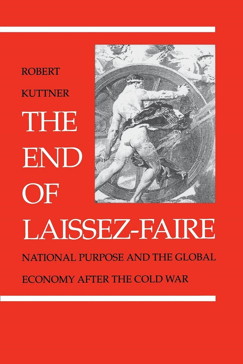The End of Laissez-Faire
 Buy the Book: Amazon, Barnes & Noble, IndieBound, Penn Press
Buy the Book: Amazon, Barnes & Noble, IndieBound, Penn PressTitle: The End of Laissez-Faire: National Purpose and the Global Economy After the Cold War
Published by: University of Pennsylvania Press
Release Date: February 1, 1992
Pages: 320
ISBN13: 978-0812214017
Overview
Here is a book that explores what American economic policy should and can be—a superb yet controversial interpretation of the relation between domestic economic health and international politics, and of how we should set priorities to maintain our economy and our competitive vigor in the future.
Praise
"Kuttner's intellectual candor and vigorous literary pitch are above reproach. . . . The book deconstructs splendidly the incoherencies and hypocrisies embedded in U.S. trade policies."
—Wall Street Journal
"The best in economic journalism combines high professional economic competence, good clear writing, and a decently compassionate point of view. Robert Kuttner scores high on all these counts, as The End of Laissez-Faire admirably reveals."
—John Kenneth Galbraith
"The richly detailed evidence Kuttner assembled will have to be taken into account by anyone assessing the present state of the world economy."
—New York Times
"A detailed and persuasive analysis."
—Kirkus Reviews
"Crisp and clear, admirably explicating the tactical consequences of esoteric economic theories and the history of the postwar international trading system."
—San Francisco Chronicle
"Robert Kuttner is one of the three or four best social analysts in the United States. He writes with force and clarity, out of strongly humane and moral convictions. His work keeps getting better and better, and I admire this book immensely."
—Irving Howe
"The mass media may tout the triumph of laissez-faire capitalism, but the smart observer knows that different trends are under way. . . . If American capitalism is to prosper, we will have to understand the argument and heed the recommendations in The End of Laissez-Faire."
—Lester Thurow
"Reasoned and provocative, The End of Laissez-Faire may well change the terms of the debate about America's policies in the post-Cold War period. . . . A refreshing reminder of the need for both vision and pragmatism."
—Mario Cuomo